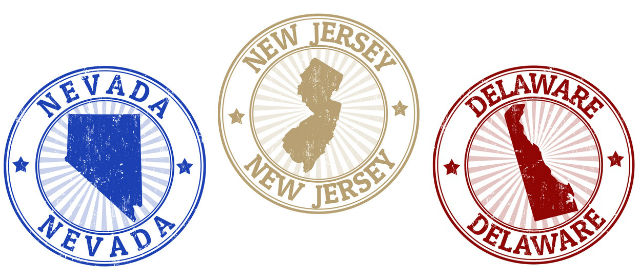Online poker players in New Jersey, Nevada and Delaware woke up to some very exciting news on Monday morning: Players in all three states will soon be competing against one another. The recent rumors were true, and the liquidity sharing agreement between the three states will be implemented first at the WSOP NJ and 888 Poker network on May 1, according to a press statement.
Nevada online poker overview
| Poker Site | Online | Cash | 24 H Peak | 7 Day avg | Last Week | Play Now |
|---|---|---|---|---|---|---|
| WSOP US | 87 | 433 | 200 | 371,330 | Play Now |
Ultimate Poker was granted a license and launched in April 2013. That made it the first licensed and regulated online poker site in the entire country. It has since shut down.
However, two online poker sites have since launched operations in the state. Both are still up and running. They are WSOP.com Nevada, a World Series of Poker-branded online poker site and Real Gaming Online Poker, which is owned and operated by South Point Hotel, Casino & Spa in Las Vegas. Unfortunately, only WSOP.com has the traffic to run tournaments and cash games regularly.
Nevada online poker laws
The actual bill that became the current law governing online poker in Nevada is known as AB 114. The law only permits the operation of online poker sites. Plus, it dictates players on the sites must be inside state lines to play for real money.
The operation of sites that host other casino games outside of poker is not authorized by this law.
Since the bill became a law in February 2013, NGCB has issued several online poker operators licenses to online poker and other gaming technology companies. However, just three online poker sites have ever opened up to the public in the state.
Ultimate Poker launched in April 2013 but shut down in November 2014. WSOP.com launched in September 2013. Real Gaming Online Poker launched in February 2014.
What is or is not legal in Nevada?
It is legal to play online poker on state-licensed and regulated sites in Nevada. However, the sites and players must adhere to specific online poker regulations set by the Nevada Gaming Commission. These include:
- Players must be 21 or older and sites must verify identification.
- Players must be inside state lines to play for real money and sites must verify location using geolocation software.
- Player fund transfers are not allowed.
- Players are only allowed to have a single account on each site.
- Operators must maintain a reserve equal to the total of all player funds.
- Rake cannot exceed 10 percent.
- A 10-year bad actors clause prohibits offshore poker sites that previously accepted US customers from being licensed to operate in the state.
Where can I play poker online in Nevada?
There are two online poker sites open to players inside Nevada, regardless of where they’re from: Real Gaming Online Poker and WSOP.com.
Real Gaming Online Poker
The South Point-backed Real Gaming Online Poker launched in February 2014.
Real Gaming has struggled from the outset, and although the site is still operational, traffic is negligible. It is often very difficult to find a game outside of peak primetime hours.
When the games do run they are strictly of the low-stakes No-Limit Hold’em variety. The Real Gaming Online Poker software is capable of running various multi-table and sit and go tournaments, but the site almost never has enough players to support them.
WSOP.com
The other and only real choice for online poker in Nevada is WSOP.com. This Caesars Interactive Entertainment-operated site is by far the largest regulated online poker room in the state. It has real-money online cash games and tournaments running around the clock.

Traffic on the site peaks in the months of June and July during the annual WSOP in Las Vegas.
In fact, WSOP.com now runs a massive online satellite schedule offering players the chance to win entry into some of the WSOP’s biggest live and onlineevents. Of course, this includes the WSOP Main Event.
In 2015, the WSOP offered players the first-ever chance to win a WSOP bracelet through a single $1,000 online tournament on WSOP.com. The final table played out live in Las Vegas. WSOP.com did the same thing in 2016. However, in 2017, it hosted three online WSOP bracelet events that play to a conclusion online.
In 2018, WSOP.com is planning to offer four online WSOP bracelet events, including the first-ever Pot-Limit Omaha online bracelet event.
WSOP.com also offers legal and regulated real-money online poker in New Jersey. Plus, the site has shared player pools with 888 network online poker sites in Delaware since 2015.
That player pool got even bigger on April 30 when the site began sharing players with the sister site WSOP.com NJ. The pooled players immediately filled up the cash game tables, with over 400 players on the first full day of operation.
Where can I play poker live in Nevada?
Nevada is the casino capital of the country. As such, there are more places to play live poker in the Silver State than any other.
In fact, the NGCB said there were 62 poker rooms and 580 tables operating across the state at last count. There’s live poker everywhere from Las Vegas to Reno and all the way to the tiny city of West Wendover on the Utah-Nevada border.
However, the majority of the action is in Clark County. That’s where the Las Vegas Strip is located. There are a whopping 38 of the state’s 62 brick and mortar poker rooms in Clark County.
Some of the most popular places to play poker on the Las Vegas Strip include the poker rooms at Bellagio, Aria, and The Mirage. Off the strip, The Orleans and Downtown Las Vegas’ Binion’s Gambling Hall often top the list of players’ favorites.
Poker room revenues average close to $9 million a month statewide. However, the numbers jump when the WSOP rolls into Las Vegas annually in June and July.
History of online poker in Nevada
Online poker began booming in the US in 2003. First, a Tennessee accountant named Chris Moneymaker won entry into the World Series of Poker Main Event through an online satellite. He went on to capture the world title and $2.5 million. Then, the popularity of poker on TV, sponsored by online poker sites, simply exploded.
The US government’s first attempt to curtail the activity and get control of market came in 2006 when Congress passed the Unlawful Internet Gambling Enforcement Act (UIGEA). This forced US banks to stop processing transactions for offshore online poker operators and pushed several of those operators out of the US market. However, several major operators stayed, and online poker’s popularity continued.

Five years later, on April 15, 2011, the U.S. Department of Justice charged top executives at major online poker operators including PokerStars, Full Tilt Poker, and Absolute Poker/Ultimate Bet with money laundering and illegal gambling charges. This pushed these sites out of the US and effectively closed the door to online poker in America.
However, by the end of the year, signs that door could be opening again began to surface.
In December 2011, the DOJ released a legal opinion that the Federal Wire Act only applies to sports betting. This paved the way for states to begin to consider licensing and regulating online poker and casino sites. That same week, NGCB approved draft regulations authorizing online poker.
Legal and regulated online poker in Nevada
The political process took more than a year, but on Feb. 21, 2013, Nevada Gov. Brian Sandoval signed Assembly Bill114 into law, legalizing online poker inside Nevada’s borders.
It also opened the door to interstate liquidity compacts. Delaware and Nevada signed the first compact in 2014. WSOP.com began sharing player pools with the three 888 network sites in Delaware under the agreement in March 2015. New Jersey signed onto the agreement with both states in October 2017.
Ultimate Poker, a majority-owned subsidiary of Station Casinos, became the first licensed and regulated online poker site in the US when it launched at the end of April 2013. The World Series of Poker-branded WSOP.com entered the market in September 2013 and almost immediately became top dog.
The South Point-owned Real Gaming Online Poker launched in February 2014, but had little impact on the market. For all intents and purposes, the Nevada online poker market became a one-horse race in November 2014 when Ultimate Poker shut down.
The age of interstateonlinepoker in the US has officially arrived.
Following a monthslong buildup, interstate online poker player pooling between Nevada, New Jersey, and Delaware went live on Monday evening at around 10:30 PM EST.
Interstate play is here and with it comes the $15 million summer, including an upgraded loyalty program, bigger tournament guarantees, and 4 Online Bracelets. NV players, make sure to download the new client. Head to https://t.co/d6DW8pasid and click download on the main tab. pic.twitter.com/TADEwgedvX
— WSOP.com (@WSOPcom) May 1, 2018
Even though the merger of the three states wasn’t without some technical issues, it marks one of the most pivotal moments in legal US online poker history.
“It’s a monumental day for online poker in the United States,” said WSOP.com’s Head of Online Poker Bill Rini. “This is truly a game-changer for players and we hope is the model blueprint for additional states to join the fray.”
Launch timing allows WSOP.com to crawl before it walks
The launch comes nearly a month before the start of the World Series of Poker tournament series. That gives WSOP.com plenty of time to get all of its poker chips neatly stacked before thousands of poker players descend on Las Vegas for the world’s greatest poker tournament series.
As such, WSOP.com can systemically test its new network with increasing rigor.
First, the Monday evening launch gives WSOP.com several days to identify and correct any technical issues that rear their head before the weekend traffic spike.
The increased traffic on the weekend of May 5-6, as well as the first big Sunday tournament between the three states, will serve as a second test for the Coast-to-Coast Classic tournament series that runs from May 11-20.
And the Coast-to-Coast Classic is yet another test — a test to make sure the new three-state WSOP.com network is ready for the even bigger surge in traffic it can expect once the 2018 World Series of Poker at the end of May.
In addition to the increased cash-game traffic the network expects during the WSOP, WSOP.com is running four online bracelet events this year, and for the first time, players in Nevada and New Jersey will be able to participate.
The four online bracelet events are:
- June 3, Event No. 10: $365 No-limit Hold’em
- June 22, Event No. 47: $565 Pot-limit Omaha 6-Handed
- June 29, Event No. 61: $1,000 No-limit Hold’em
- June 30, Event No. 63: $3,200 High Roller
Players should see ongoing traffic gains
Nj And Nv Online Poker Games
Despite its late-night launch, and complaints that the download process wasn’t working, cash game traffic numbers at WSOP.com were up by about 33 percent on Monday night, with peak numbers of more than 300 players.
Average and peak cash game traffic numbers should continue to steadily rise over the coming weeks.
Nj And Nv Online Poker Online
- News of the merger will continue to spread and will hopefully reactivate lapsed players and draw in new ones.
- Account registration issues will be dealt with, and more and more players will register their new Nevada accounts.
- WSOP.com is running a host of promotions, including a new “Poker Rewards” loyalty program with higher rakeback levels, as well as multiple major tournament series to capitalize on the new liquidity sharing agreement.
- Liquidity begets liquidity, and the larger the WSOP.com network becomes, the moreappealing it will be to existing and potential online poker players.